Spring has sprung and everyone is crawling out of their burrows to see it. Trees are once again dressing themselves in green, giving hope to the new planting season. As we begin to look around, we see countless things that need to be done and it seems like just the time of year to do them.
If you’re anything like me, the list of projects never ends. It’s not that I don’t get projects done; it’s just that I seem to manage to add to the list faster than I close them out. Of course, my wife helps with that too, as she can always come up with things for me to do.
With that being the case, the issue for me is prioritizing my projects, rather than coming up with them.
Nevertheless, there are certain projects that springtime seems to be ideal for, just like people do their annual “spring cleaning.”
Perhaps this goes back to the days when most people lived on farms and heated their homes with wood fires. But whatever the reason, there’s plenty to do in the spring.
Add to Your Garden
The first thing to get working on in the spring is your garden. If you topped off your garden beds with compost in the fall, it should be ready for planting in the spring.
The worms will have been munching happily away at that compost all winter long, mixing it in and making it ready.
I like to build a new planter or two early every spring, increasing the size of my garden.
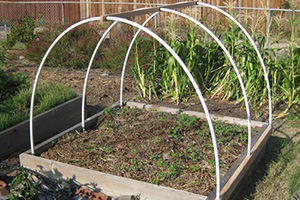
That new bed isn’t going to give me the best results the first year, but by starting it out I can gradually increase the size of my garden. Then by the next year, it’s ready to go as a part of my regular garden. Increasing slowly like this is both easier on the budget and easier on the guy doing the work.
If you live in the north and haven’t already built one, you’re going to want to have a greenhouse for germinating your seed. A simple greenhouse can be built out of PVC pipe and visqueen.
Related: DIY Mini Greenhouse For Year-Round Vegetables
This will keep your seeds from freezing, allowing the sprouts to form and preparing them for planting in the garden. The two to three weeks of extra growing time that gives you can make a huge difference in your harvest.
How’s Your Rainwater Capture?
While we’re on the subject of gardening, don’t forget about rainwater capture. If you don’t already have a system in place, then spring is a great time to build one, providing water throughout the year.
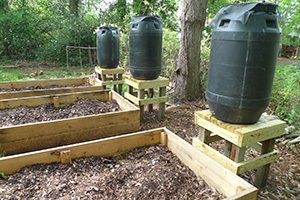 Besides having that water available for emergencies, it can be used for gardening.
Besides having that water available for emergencies, it can be used for gardening.
For that matter, overflow from the rainwater capture system can easily be diverted into your garden beds, so that it waters them even in those times when there isn’t a lot of rain.
If you already have a rainwater capture system in place, then it’s time to check that everything is in good working order. Wintertime can be hard on gutters and downspouts, especially if ice formed on the roof.
It’s not uncommon to need a few repairs to the gutters or even the replacement of a downspout or two if they got plugged up with ice.
What’s that Clucking I Hear?
Probably the most challenging part of becoming self-sufficient is in producing animal protein. If you don’t own a ranch and live in town, your options are limited.
But many municipalities allow you to have poultry, at least on a limited basis. This makes chickens, specifically “layers,” a great option for preppers.
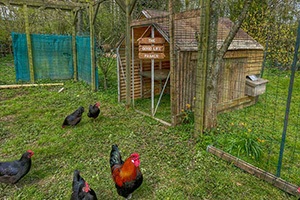
Hens need to grow about six months before they start laying; so spring is a great time to start your flock.
Before buying chicks, you’ll need someplace for them to live and grow. That means a coop of some sort. The coop gives them someplace to live and to roost at night.
They’ll also hopefully do their laying there. A pen, attached to the coop gives them someplace to move around, getting exercise and eating whatever they can find. Six hens should give you four eggs per day.
Related: Livestock Animals You Should Start Raising For The Upcoming Economic Crisis
How About a Fish Pond?
For another source of animal protein, you might consider putting in a pond.
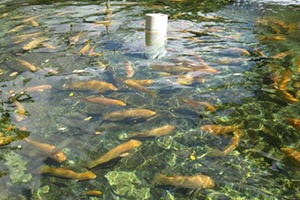 Springtime is a good time for this one too, as it gives your fish several months to grow, before cold weather kicks in again.
Springtime is a good time for this one too, as it gives your fish several months to grow, before cold weather kicks in again.
Then you’ll either have to harvest them all or move them into a tank to winter. Tilapia is the easiest fish there are to grow, although not the most nutritious.
They also survive well in a high density environment, making it easy to transfer them to a fish tank for the winter.
Other than catfish, tilapia are also the best at keeping their environment clean, as they will eat algae forming on the sides of the pond.
Start Gathering Firewood
Our ancestors used to cut firewood in the wintertime, giving it all year to season. That gave rise to Henry Ford’s saying, “Chop your own wood, it will warm you twice.”
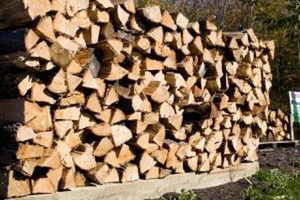 Wintertime was a good time to cut firewood, as the sap was down in the tree’s roots and there weren’t any crops to attend to.
Wintertime was a good time to cut firewood, as the sap was down in the tree’s roots and there weren’t any crops to attend to.
Today we don’t do things this way. But it still makes sense to cut firewood as early as possible, giving it as much time to dry as possible, before it’s needed in the winter.
Be sure to keep the fresh cut in separate piles from the older, seasoned wood, so that the older wood can be used first.
FIFO (first in, first out) isn’t just for stocking the pantry shelves, it works for firewood too.
Put that Sunshine to Good Use
With spring here and summer on the way, we’ve got more sunshine to look forward to. That not only makes for summer sports and activities, it’s also great for solar power. If you don’t have any solar panels set up yet, now’s a great time to install some.
I make my own solar panels, which is a rather tedious process. Nevertheless, it saves me about half the cost of them, which makes it worthwhile.
Related: How To Make Your Own Solar Water Heater
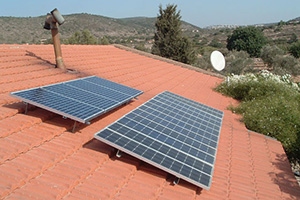
Since I’m not working outside in the wintertime, it’s a great time for building a couple more panels.
Then, when springtime comes, it’s time to add those new panels to my array, getting them up on the roof where they can do the most good.
By the way, if you look at most commercial solar panel installations on homes, the installers mount them at the same angle as the roof. That may not be the best for you, depending on your latitude and the direction your home is facing.
They should be mounted facing due south (not magnetic south), with the angle of the panel depending on the latitude. The basic idea is to have the solar panels pointing as directly towards the sun as you can.
More Good Use for the Sun
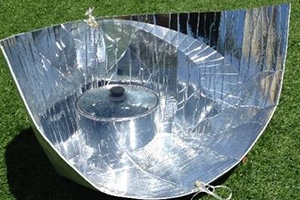 Sunshine can be used in a lot of ways, not just to generate solar power.
Sunshine can be used in a lot of ways, not just to generate solar power.
One of my favorites is using it to cook.
There are a number of different types of solar cookers you can build, including parabolic cookers or those that use a Fresnel lens.
Keep your eyes open for someone who is getting rid of one of the old-fashioned big screen televisions, one of those that took up a whole corner on the living room.
The screen on those is actually a big Fresnel lens (flat plastic magnifying glass); so scavenge it for making a cooker.
Then put it in a frame, adding a stand for it and for a pot of food. Mine gets hot enough that I can fry an egg in one minute or melt pennies in five.
You may also like:
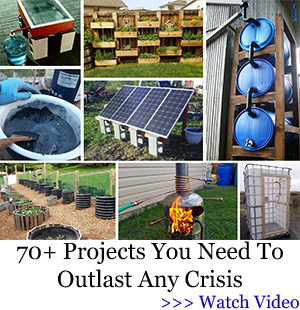 How To Use The Old Cupping Method To Get Rid Of Back Pain
How To Use The Old Cupping Method To Get Rid Of Back Pain
Backyard Projects That Might Get You Arrested (Video)
DIY Wilderness Soap And Shampoo From This Plant

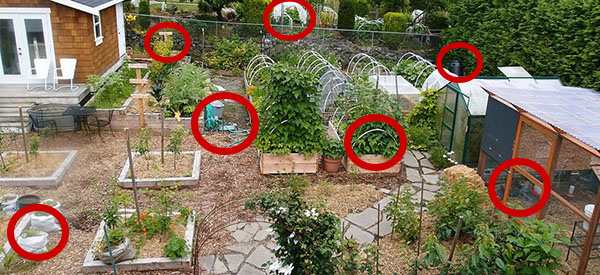













I saw a tomato support system made of PVC on here some time ago but can’t find it now. Can you help me please
Interesting list of possabilities. Since I’d don’t have a Honey Do Husband the lists I make are mine to accomplish. Adding to the garden space and starting seedlings for two gardens plus extras is enough fir the moment. The unfinished urgent projects are also calling…
Great article. I’m alone now, and need all the energy I can muster ro get things done. Project 1, finished the pit out front with dirt and rocks. When that settles, something eatable and thorny can go in. Finish the compost pit/gray water recovery and the water trench. It goes on, ’round to it list of to-dos. niio
Red: Alone now?? I hope your family is doing ok. Take care.
The job list never seems to get shorter; I think I’m just getting slower.
Our last good rains put a good amount of water into the dams and the new tank gives me 14k gallons storage and the windmill keeps them full. The water is very red from the clay content but the garden, stock and toilet don’t mind. And my house water tanks are nearly all full going into winter which is a change from most years. I’ve got a few fruit trees planted and another bunya pine. Still have the mornings and some stone pines to plant but my coffee bushes and avocados didn’t like the alternative water I had to use over the summer and died back a lot.
Got a clutch of eggs in the incubator and some GF keets ready to let out in the next week or so. Been working on my last merino fleece picking it over for spinning but I’ve got a week of audits and paperwork which I’m not looking forward to.
Today is vaccinating my ewes before lambing and cutting up the meat hanging in the chiller- that list is still pretty loooong.
Moringas not mornings. Darned autocorrect on the phone.
My time is taken these days nursing my wife through the paralysis caused by neuro-invasive West Nile Virus, but there are still all the spring projects. My big one this year was building a new raised vegetable bed from 36″ commercial grade erosion barrier. I made it 4′ wide and 25′ long, each side supported by 5 t-posts. It was cold late here so I just finished planting it, jalapeno and habanero, various beans, and a border of sweet onion.
SHTF is a sudden catastrophic change in your life, it could be a Coronal Mass Ejection, or maybe just a skeeter bite.
JH: My sympathy for your plight. I too am caring for an indisposed spouse and well appreciate the toil involved. There is a book I am plowing through called The Thirty-six Hour Day. Its subject matter is dealing with a loved one suffering from dementia but many of the suggestions about daily care are applicable to any situation where one is supporting an incapacitated loved one. I am not finished reading it because it is downer reading and thus I find I can only read a chapter or so at a time. I don’t know if I would recommend it or not until I finish it. You might look at a review of it and decide if it is for you. It is available on Kindle and in hard copy.
JH: yes, take care and hope your wife recovers soon.
Judge, you have my sympathy. I just lost my youngest son. Then his kid sister, who was very close to him, was recalled by Navy before she could attend the memorial.
Onions and legume do not get along well. While onions take advantage of the extra nitrogen, very often they kill the legumes. niio
Red, so sorry for your loss. Thoughts and prayers.
Rain water harvesting may be the most important of all the
summer projects. Most of the farm and ranch stores have the 45/50 gallon barrels with a spigot.
The barrels started life as a container for either peppers or
pickles so the odor is hard to get ride of. Try bleach and or
baking soda.
Thank you, sir. West Nile causes dementia but happily one recovers from it. We’ve been together 40 years, we just went through 3 months of her not knowing where she was or what was happening, but the person I know so well was always there. Very strange, a preview of the end of life. We’re lucky, she is recovering well, I can tell by how grouchy she is lately.
If there is ever a big breakout of West Nile people are gonna go crazy, it makes Covid look like a bad cold.